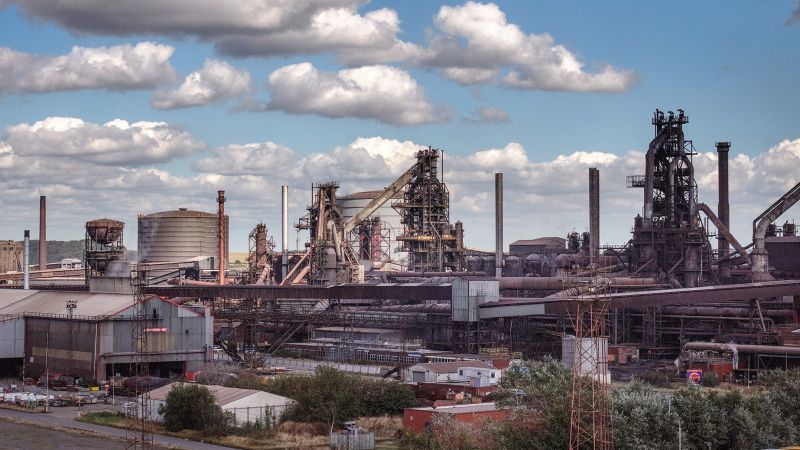In a surprising move, Britain’s parliament was recalled during what was supposed to be an Easter recess, prompted by the looming potential closure of the British Steel plant located in Scunthorpe, northern England. This decision, unusual for Parliament—which usually assembles only in times of national emergencies such as wars or significant tragedies—was sparked not by a public crisis but rather by a significant economic concern: the future of steel production in the UK. The urgency surrounding the situation was heightened by the possibility that the Chinese-owned Jingye Group, the plant’s current operator, was on the brink of halting essential raw material orders, which would jeopardize the entire process of steel manufacturing in the country.
During this extraordinary parliamentary session, lawmakers voted to implement emergency control measures over the Scunthorpe steelworks, with reports indicating they even enlisted police to prevent Jingye staff from accessing the site. Jonathan Reynolds, the Secretary of State for Business, Energy and Industrial Strategy, hinted at the likelihood of full nationalization of the plant, a complicated and costly undertaking that would see the British government assume full operational responsibility for manufacturing—a task it has traditionally delegated to private companies, often foreign-owned.
The situation reflects a troubling trend for the UK steel industry, which has seen its global output dwindling to a mere 0.3% while relying increasingly on steel imports to satisfy domestic demand. The government’s intervention in taking control of the Scunthorpe facility underscores the complex balance nations must strike between remaining integrated in a globalized economy and safeguarding key industries deemed too strategically important to be left to market forces.
Historically, British Steel has undergone numerous ownership changes since its privatization in the 1980s, but Jingye’s experience has been especially fraught. The global market is currently facing an oversupply of Chinese steel, exerting tremendous pressure on British manufacturers who struggle with high operational costs, especially energy. Jingye asserts that the Scunthorpe plant is operating at a loss of £700,000 (approximately $926,000) daily, leading to claims that it has become unsustainable.
As tensions mounted, Lin Jin, a representative from China’s Foreign Ministry, cautioned Britain against conflating economic cooperation with political security matters, warning that doing so could undermine the confidence of Chinese investors in the UK. Negotiations between Jingye and the British government to sustain the plant ultimately collapsed, with Reynolds alleging that the Chinese firm was willing to act unilaterally to eliminate orders necessary for sustaining steel production. He voiced that the government couldn’t allow the last blast furnaces in the UK to cool down, as restarting them is both challenging and costly.
Experts and analysts have pointed to a notable shift in the UK government’s approach, which appears increasingly responsive to nationalistic pressures and the demand for a stronger domestic industrial policy. David Edgerton, a historian from King’s College London, noted that the Labour government desires to position itself as more nationalistic. This trend stems from both the influence of U.S. policies regarding domestic industry and the UK’s long-term decline in industrial output due to decades of globalization.
The idea of nationalization isn’t wholly new, as concepts resembling “securonomics” have been gaining traction, with advocates calling for a rebuilding of Britain’s industrial foundations. However, the government’s hasty move comes amid unanticipated circumstances; Labour’s impending publication of a long-awaited industrial strategy was due shortly, leading many to speculate that the government is feeling pressure and irritation about having to respond decisively to the steel crisis before it could unveil its broader industrial vision.
The decision to take control over the Scunthorpe plant reflects not only an appeal to national pride—a sentiment expressed by Prime Minister Keir Starmer regarding the heritage and significance of steel production—but also requires the Labour government to address geopolitical concerns as Europe faces a changing military landscape following U.S. policy shifts. The urgency of securing domestic production capabilities is further amplified by job preservation concerns, with thousands of positions on the line.
Despite this urgency, critics have pointed out inconsistencies in the government’s approach, particularly highlighted by the situation at another facility in Port Talbot, Wales, which no longer operates despite the loss of 2,800 jobs. The complexities surrounding the potential nationalization of British Steel signal risks of setting a precedent that could invite pressure from other distressed industries seeking government intervention.
As Britain’s steel industry grapples with existential questions, discussions around nationalization invoke discussions not just of market stability but also raise queries regarding the country’s approach to international trade relations, particularly with China. The changing phrases of diplomacy, once characterized by favorable exchanges under former leaders, have become convoluted as the UK navigates its relationship with China amidst broader geopolitical dynamics and criticism about foreign ownership of key industries.
Overall, the British Steel crisis encapsulates a moment of reckoning for the UK—a clash of market ideologies, national interests, and complex international relations that may well shape the industrial landscape for years to come.



